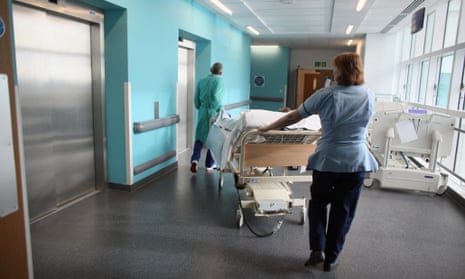The UK’s healthcare system is falling behind on avoidable hospital admissions and on improving survival rates for common diseases when compared with other high-income countries, according to a report.
The report from Quality Watch, a joint Nuffield Trust and Health Foundation research programme, says it is worrying that the UK performs worse than most countries on more than half of the 27 indicators analysed.
The UK’s total health expenditure as a proportion of gross domestic product (GDP) is one of the lowest of all the countries analysed, lower than countries such as France and Germany. At 8.7% per head, it is similar to that of Italy, Spain and Sweden.
This article includes content hosted on d26adhsj11a4c2.cloudfront.net. We ask for your permission before anything is loaded, as the provider may be using cookies and other technologies. To view this content, click 'Allow and continue'.
Although the UK does well for the number of potentially preventable admissions for diabetes, the numbers of preventable admissions for other chronic conditions, such as asthma and chronic obstructive pulmonary disease (COPD), remain relatively high.
There were 61 UK admissions for asthma per 100,000 population in 2011, compared with 13.6 in Canada and 11.4 in Italy.
However, there are indicators where the UK is currently performing better than most countries.
One of these is low antibiotic prescription levels, primarily driven by high flu vaccination rates. The World Health Organisation previously issued a global message to encourage all countries to be more sparing in their use of antibiotics in humans and animals.
Another is breast cancer screening. Between 2000 and 2012, an average of 76% of 50-to-69-year-old women in the UK were screened for breast cancer. The Netherlands was the only other country, of those analysed, to have a higher screening rate (80.1%).
However, survival rates for other cancers and mortality from heart attacks are areas where the UK is shown to be lagging behind most other high-income countries.
Even though between 2008 and 2011 the UK mortality from heart attacks for those aged over-45 dying after 30 days dropped from 12 to 10 per 100 patients, it still records the highest of the five countries where comparable data is available. Norway records the lowest figure at 8.2 but is closely followed by New Zealand (8.4) and Sweden (8.5).
The report also shows that between 2007 and 2012, 82% of women in the UK survived over five years with breast cancer, compared with 87.4% in Sweden.
Last month, the National Institute for Health and Care Excellence published guidance on symptoms and tests for doctors and patients, which it stated could save thousands of lives if acted upon. As my colleague Sarah Boseley writes:
There are 10,000 more deaths from cancer in the UK every year than the average in Europe as a result of diagnosis that may come too late for effective treatment.
Half of those lives could be saved, Nice said, if patients and their doctors used the guidance, which has taken three years to develop, on symptoms that could warn of one of 37 cancers.
The Focus On: International Comparisons of Healthcare Quality report looks at 27 care quality indicators in up to 15 OECD countries between 2000 and the last year for which data are comparable.
Commenting on the report, Nuffield Trust chief executive, Nigel Edwards, said:
“Interpreting international data on healthcare systems is notoriously tricky, and any comparisons should be handled with care.
However, it is clear from this analysis that the UK can and should do better. Our poor performance on cancer survival compared with other leading countries is well-known and continues to be a concern.

Comments (…)
Sign in or create your Guardian account to join the discussion